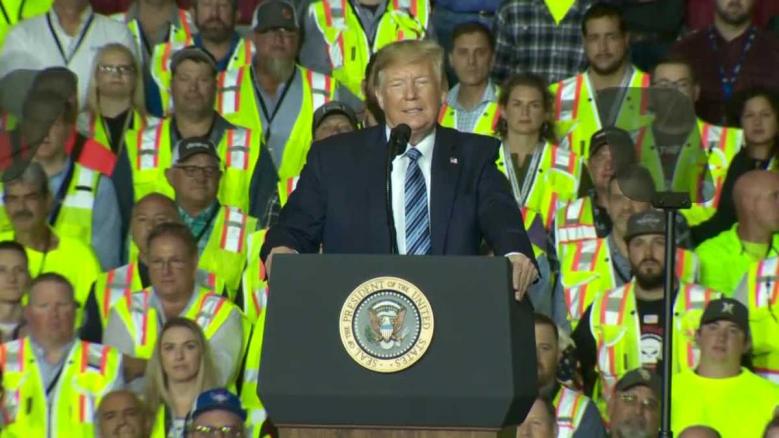
Shell shows President Trump how energy can revive Appalachia, USEA chief says
Washington, D.C.—Today, President Trump toured Shell’s planned ethane plant in Western Pennsylvania citing it as a great example of how the American shale revolution supports thousands of long-term high-wage jobs in Appalachia, an area that continues to be resurrected by the oil and gas industry.
Shell’s $6 billion Pennsylvania Chemicals Project in Potter Township, Beaver County, about 30 miles northwest of Pittsburgh, represents one of the largest economic development projects in the country. It is the largest construction project in the state since World War II and promises more than 6,000 jobs, including manufacturing jobs.
The facility, which will become operational in in the next several years, will process Marcellus shale gas into ethane and polyethylene, for a spectrum of products including: plastic bags, food packaging, automotive parts and medical devices.
Energy Secretary Rick Perry and EPA Administrator Andrew Wheeler joined President Trump on the tour.
In a statement following the event, USEA Executive Director Barry Worthington said:
“I’m thrilled that President Trump visited my home state today, that his administration continues to advance sound energy policies that encourage production and processing of our Marcellus shale resources.
“Shell is a USEA member, and we are pleased its Pennsylvania Chemicals Project will bring at least 6,000 new jobs to the region and supply the world with American-made plastics.
“Global energy demand is expected to double by 2050. Shale gas will continue to play a significant role in meeting that demand, especially Appalachian shale gas, which comprises 27% of U.S. natural gas supply. Pennsylvania is a bastion for American natural gas. Natural gas production in the state grew almost 15% in the first quarter of 2019 compared with the same quarter last year.
“From 2016-2018, the state saw 16 new gas plants worth $15 billion come online. And while pipelines are expanding in the region, we support the Trump administration’s keen awareness that we need to expand infrastructure to deliver and export this much needed natural gas.
“President Trump’s legacy, his economy, as Secretary Perry aptly notes, is driven by his energy policy. This administration has given our industry the tools it needs to innovate, produce and deliver energy to Americans and our allies.
“The U.S. is the largest oil and gas producer in the world. That didn’t happen overnight, but Trump administration policies have untied the hands of industry from redundant regulations, and painfully slow permitting processes to unleash this energy abundance, which we now share with the rest of the world in fuel and products.
“This administration encourages innovation across the energy sector, including but not limited to the oil and gas industry. More efficient production and delivery is exactly the path forward in my view. Today’s event captured how our industry can brings jobs, prosperity and resurrect areas of this country that have been otherwise devastated.”
Perry told USEA, “We see this as just the beginning. The Appalachian petrochemical industry has the potential to create 100,000 jobs in the coming decade and inject tens of billions into the economy over the plant’s lifetime.”
Perry said the region could support at least four more plants of this kind which would make intermediate chemical products that feed manufacturing facilities throughout the Midwest and East Coast.
Earlier this year, in an Executive Order, President Trump asked that his Energy Department to find ways “to promote economic growth of the Appalachian region, including growth of petrochemical and other industries and methods for diversifying the Appalachian economy and promoting workforce development,” Perry said.
“Today nearly a third of U.S. manufacturing involving petrochemicals is within 300 miles of Pittsburgh. This manufacturing base creates $300 billion in revenue annually and employs 900,000 workers. These numbers only have the potential to grow,” Perry said.
###
